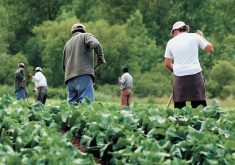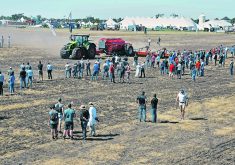Worries about food supply chains in the face of COVID-19 virus effects and restrictions have prompted the National Farmers Union to demand that farmers markets be declared as essential services.
There are more than 650 farmers markets operating in Canada, some of them year round and most only seasonally.
The NFU believes the markets to be an essential component of local food systems but they could be under threat due to provincial and municipal health directives that result in business closure or restrictions on crowd size and distance protocols.
Read Also

Farming Smarter receives financial boost from Alberta government for potato research
Farming Smarter near Lethbridge got a boost to its research equipment, thanks to the Alberta government’s increase in funding for research associations.
Hilary Moore, an NFU board member in Ontario, said concerns were raised when Halifax moved to disallow operation of farmers markets and encouraged operators to devise delivery systems for their products instead.
“That line of thinking seems to be a popular line,” said Moore. She said some operators of markets in Saskatchewan have taken the same tack.
“Farmers Markets of Ontario has just put out a statement saying that they’re encouraging markets to also close. Some have closed because they are city run or their landlord, wherever they’re housed, has decided to shut.”
However, in Thunder Bay, Ont., for example, the farmers market has been declared essential and will stay open.
On March 20, Alberta’s chief medical health officer, Deena Hinshaw, said farmers markets in that province would continue to operate under the same restrictions as grocery stores with regard to social distancing and sanitation.
Moore said there has been no official response to the NFU demand about an essential services declaration on a wider scale but it has started the conversation from which plans can be made for year-round as well as seasonal markets that will begin operations in summer.
Marcus Riedner, a farmer and self-described food activist, who operates Happiness By The Acre near Didsbury, Alta., sent an open letter to farmers and friends of farmers about his worry over effects on markets.
Restrictions on mass gatherings have resulted in closure of many of the usual venues.
“For the Alberta local food scene this is an economic disaster,” Riedner wrote about potential closure if it occurs. “Local farms rely on the short summer and autumn farmers market season to make the majority of their income for the year. We have 20 weeks. At this point it looks like we will be shut down, at best, for half of that, most likely the entirety.”
If that occurred, Riedner said it could destroy some farms at worst, and even at best drastically reduce incomes. His own farm needs to sell $1,200 worth of produce per week through the 20-week season to turn a profit.
Moore said delivery is an option for some vendors at farmers markets but much depends on time, location and, perhaps most importantly, available labour.
“It would add a huge layer of complication to any farmer,” she said.
Moore did not see any issues with physical distancing related to gathering that could not be managed by market vendors “with a little creative thinking.”
The NFU statement added that farmers markets ensure availability of fresh local produce for consumers.
“Open air markets may also offer a safer alternative to grocery stores as there are fewer surfaces that need sanitizing and customer behaviour can be more easily monitored by vendors,” it said.
“Vendors who sell at farmers markets already must meet public health safe food handling requirements, and farmers know how to address biosecurity risks. As long as grocery stores remain open to the public, so should farmers markets.”


















